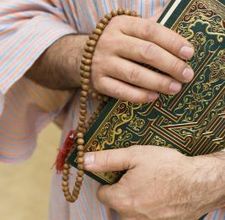
[Based on a Lecture given by Nouman Ali Khan]
Why we need Reminders
The ultimate remembrance or reminder is the Quran.
Allah says: Remind (them) with the Quran
[Surah Al-An'am:70]
Even if we know about taqwa we need to be reminded because we forget. Why does Allah mention taqwa repeatedly in the Quran? To remind us.
Relation Between Obedience & Mercy
Allah says:
And obey Allah and the Messenger, that you (all) may be shown mercy
[Surah Al-Imran:132]
If you are hopeful for the mercy of Allah it depends on your obedience to Allah and His Messenger (sallAllahu alaihi wa sallam). If you hope for Allah’s mercy you must be obedient to Him.
Allah says:
And hasten to forgiveness from your Lord and a garden as wide as the heavens and earth, prepared for the righteous.
[Surah Al-Imran:133]
Sari’oo means running towards something. Allah describes in the ayaat before as people running towards dunya. Now he says run towards forgiveness. We run towards things we are in need of. So we need to acknowledge that we are in need of Allah’s forgiveness. We are not free of sin.
And the second incentive is, run towards Jannah that is prepared for the muttaqeen, those who are truly cautious, afraid and careful. What are the qualities of these people of Taqwa? Allah goes on to describe them.
First Quality
Allay says:
Those Who spend [in the cause of Allah ] during ease and hardship
[Surah Al-Imran:134]
If anyone else sells you something without showing you the product you wouldn’t buy it. But we have not seen Jannah yet we trust Allah. So Allah is selling Jannah. But selling involves an exchange and everything we have is Allah’s anyway, so what is the exchange? There is no exchange, but Allah speaks in terms we will understand, because we are greedy and always look for a good deal. Spending here also includes spending energy and not just money, Allah did not say amwaal (wealth, assets) but anfaq, includes wealth, time, youth, energy, priority, planning. It means sacrificing for Allah, losing and letting go of the things we love for the sake of Allah to get this attribute of Taqwa.
Second Quality
Allah says:
And who restrain (swallow) their anger
[Surah Al-Imran:134]
The verse implies those who swallow their anger consistently, ism faa’il is used. Swallowing anger meaning controlling yourself as if the anger is not even there, when you swallow food it’s gone. So when you get angry you swallow your anger as if it’s not even there, not showing it. If little things always make us upset and annoy us how do we expect Allah to forgive our big sins? This shows a lack of restraint.
Abu Huraira narrates the Prophet said:
The strong person is not he who is able to physically overcome people. The strong person is he who overcomes his rage when he is angry.
[Sahih Bukhari, Volume 8, Book 73 (Kitab Al-Adab), Hadith 135, also in Sahih Muslim, Ahmad]
Ibn Abaass narrates the Prophet said:
He who gives time to a debtor or forgives him, then Allah will save him from the heat of Jahannam (Hell-fire). Behold! The deeds of Paradise are difficult to reach, for they are on top of a hill, while the deeds of the Fire are easy to find in the lowlands. The happy person is he who is saved from the tests. Verily, there is no dose of anything better to Allah than a dose of rage that the servant controls, and whenever the servant of Allah controls it, he will be internally filled with faith.
[Musnad Ahmad, classed as Sahih]
Third Quality
Allah says:
and who pardon the people – and Allah loves the doers of good (who excel in good);
[Surah Al-Imran:134]
Forgiving vs Forgiving out of Love Allah does not say “ghafireen” but “afeen”, meaning those who not only forgive, but forgive out of love. This ayah means They forgive those who treat them with injustice. Therefore, they do not hold any ill feelings about anyone in their hearts, and this is the most excellent conduct in this regard, which is why Allah describes them as Muhsineen. Forgiveness by definition means forgiving those who don’t deserve it. You are not forgiving for their sake, but your sake, so you can be part of the people of Taqwa.
Allah says
Shaytaan will no doubt try to cause dissent among you.
[Surah Al-Israa:53]
Hasan and his servant who dropped the drinks Hasan (radiAllahu anhu) was sitting with sahaba and his servant brought his drinks. On his way, he dropped the drinks and this upset Hasan. The servant immediately recited:
Servant: And those who swallow their anger
Hasan: I have swallowed my anger.
Servant: And they lovingly forgive people
Hasan: I have also forgiven you.
Servant: And Allah loves those who excel in good
Hasan: Go my servant, I have freed you
Hasan heard and he obeyed. These ayaat are supposed to exact change in our behavior. We are very nice at work and school but come to the masjid with a frown, talking bad about our brother. We are cut-throat when it comes to the Muslims.
Abu Bakr and the accusation against his daughter Aisha Take the example of Abu Bakr. There is no man that loved Rasulullah (sallAllahu alaihi wa sallam) more than Abu Bakr, his loved surpassed anybody else’s love. Moreover, his daughter was married to Rasulullah. So Abu Bakr loves Rasulullah is the messenger and because he is family. The daughter of Abu Bakr and wife of Rasulullah was accused in an ugly way (in surah Nur) by someone who he gave an allowance. Abu Bakr had every right to be angry and punish this man, how did he exact his anger? He discontinued the allowance he gave to his man. That’s all. What a big heart. Allah set such a high standard for him. Allah gives him advice in the Quran.
Allah says:
and let them pardon and overlook. Would you not like that Allah should forgive you? And Allah is Forgiving and Merciful.
[Surah Nur:22]
So is your anger and revenge worth more, or is the forgiveness of Allah worth more? If Allah’s forgiveness is worth more, you will forget about whether the person who wronged you deserves it or not, whether they are a nice person or not.
Fourth Quality
Allah says:
And those who, when they commit an immorality or wrong themselves [by transgression], remember Allah and seek forgiveness for their sins – and who can forgive sins except Allah ? – and [who] do not persist in what they have done while they know.
[Surah Al-Imran:135]
Allah here is talking about the muttaqeen doing any act of shamelessness. Whether it was a gaze that we hid or a sin we did in the middle of the night or a Fajr prayer we missed. The muttaqeen are being described that they may fall into these traps. This is easier to understand now than ever before. You can’t take a 10 minute trip without being exposed to fahsha 100s of times. They will make mistakes, but there is something they do after the mistake. They remember Allah.
Abu Huraira narrates that the Prophet said:
A man once committed an error and said: O Lord! I committed an error, so forgive me.
Allah: My servant committed an error and knew that he has a Lord Who forgives or punishes for the error. I have forgiven My servant.
The man committed another error and said: O Lord! I committed an error, so forgive me.
Allah: My servant knew that he has a Lord Who forgives or punishes for the sin. I have forgiven My servant.
The man committed another error and said: O Lord! I committed an error, so forgive me.
Allah: My servant knew that he has a Lord Who forgives or punishes for the error. I have forgiven my servant.
He then committed another error and said: O Lord! I committed an error, so forgive me.
Allah: My servant knew that he has a Lord Who forgives or punishes for the error. Bear witness that I have forgiven My servant, so let him do whatever he likes.
[Musnad Ahmad]
A Trick of Shaytaan When you do something bad and you are responsible to someone for that act, you avoid contact with them, because you know you have disappointed them. When we sin who have we disappointed? Allah. So shaytaan comes to you and says will you do good after you have sinned? You are a hypocrite, two faced. So he keeps you in sin, makes you feel embarrassed to go in front of Allah and keeps you in sin. The true muttaq as soon as he does something wrong he remembers Allah right away (not fa or thumma dhakarullah but dhakarullah).
Then they ask forgiveness from Allah for their embarrassing sins. The word for sin used here is “dhunoob”, comes from “dhanab”, that which you are not proud of, that which humiliates you. Allah says “and who can forgive sins except Allah?” Who else do we have to turn to except Allah? Only Allah knows the sins in our closet that Allah has not exposed, we need to find time to ask Allah for forgiveness.
The example of a child I was at a mall and saw a mother yelling at her child and even hitting him. Although the child was crying profusely he was still holding on to his mother. Because that is his world, he has nowhere else to turn to; around him are all tall strangers. In the same way, we have nowhere else to turn to but Allah when we sin. Where do we go, where else is there to go, who do we turn to? Even if we disappoint and fall short of the standards of our Lord we never lose hope in his mercy, we are not allowed to lose hope in him.
Written by: Abd Ar-Rafae
Taken from: Hashiyaat
